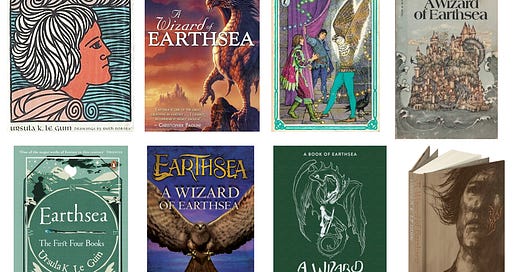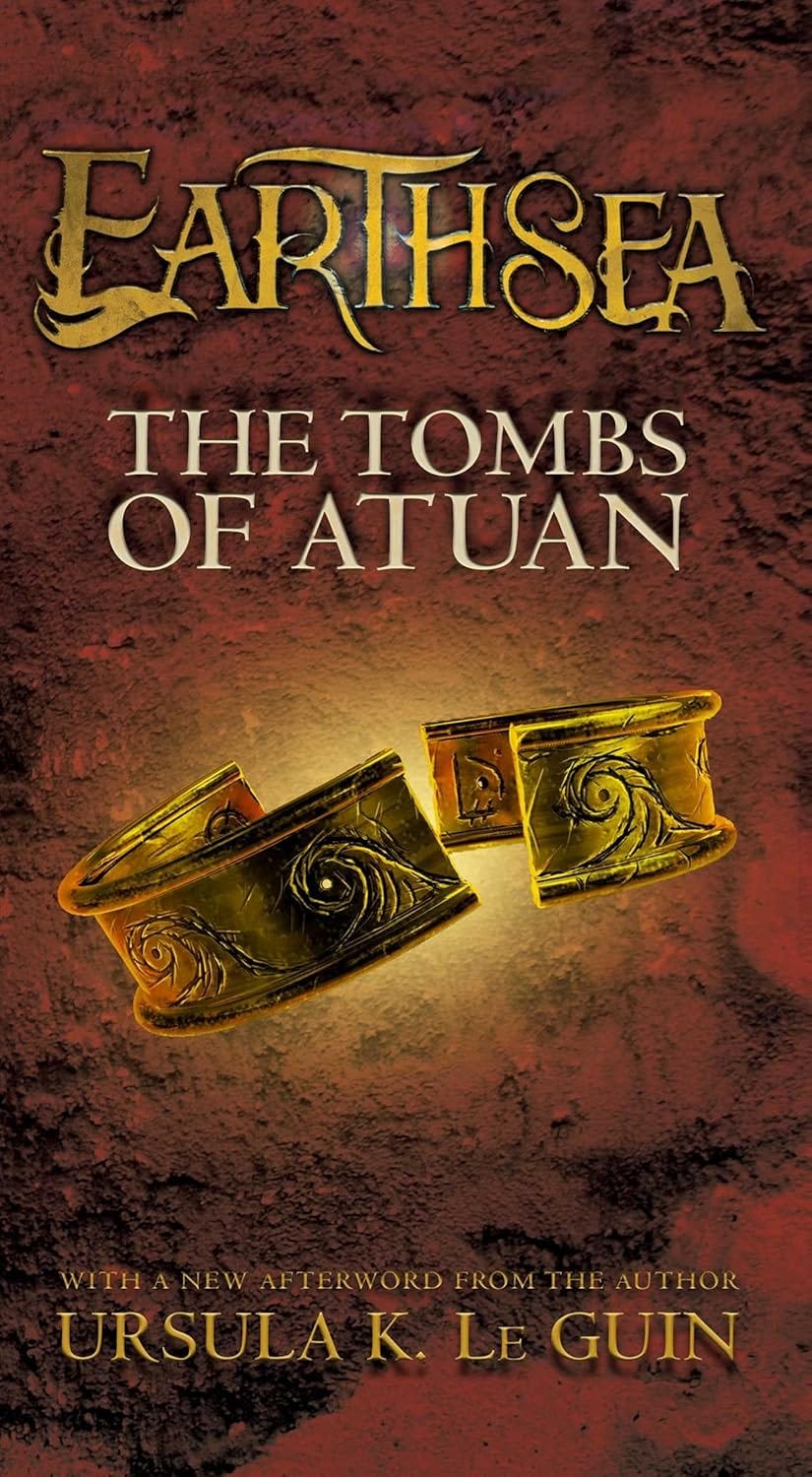Daunting Classic: The Books of Earthsea by Ursula K. Le Guin
Book I: The Wizard of Earthsea
A more and more common refrain I hear from readers, even ones in the business of publishing books, is that when they read for pleasure, they want something that they can “turn their brain off” and enjoy.
Wanting to “turn your brain off” is an understandable sentiment. The amount of information, sounds, and images we’re forced (and choose) to process in modern life means our brains our often taxed by the evening. Often, we retreat into the very vices that are responsible for this overload, passively mashing more into our already mushy heads— TikTok, reality tv, video games, YouTube, other forms of quick fix media. In this context, shutting off your brain to read a book is almost a noble option.
When I hear readers express this sentiment it reminds me that in some of the hardest times in my life. In these times, it was never the mindless coping mechanisms that got me to a better place (games, social media, trashy tv). Yes, those forms of entertainment offer a sort of balm, a temporary fix to daily anxieties, but they never provide a real solution or motivation to change. Without fail to get out of a rut—if it wasn’t, you know, other people (more important than entertainment or art I’d argue)— it was the “literary” equivalent of the books, television, or films that did the trick for me. Books that pushed, echoed, and provoked genuine emotion beyond “oh boy, I’m glad I’m distracted.”
I don’t know if I have a more complex thing to say about the subject, more than: literary fiction is escapism, too, and a better kind of it.
Fantasy is Literature, Too
Fantasy as an assembly-line commodity leaves me cold. But I rejoice when I see it written as what it always was—literature—and recognized as such.
—Ursula K. Le Guin, Afterword A Wizard of Earthsea
Ursula K. Le Guin doesn’t want her fantasy to be unchallenging pleasure: she doesn’t write it that way and she certainly doesn’t want you to read it that way. She confesses in the afterword of the first of six Earthsea novels, A Wizard of Earthsea, that she is interested in the form of fantasy, “not in who read it or how old they were.” The only concession to making Earthsea, ostensibly, a young adult novel is that Le Guin makes her protagonist younger.
While Le Guin refuses to talk down to her audience, for the most part this first novel A Wizard of Earthsea is a typical fantasy story. Your standard hero’s journey, if you will. A Wizard of Earthsea is, by Le Guin’s own omission, is conventional in most senses. Ged, a young man who comes from nothing, discovers his natural aptitude for magic. At the start of the novel Le Guin fulfills both parts of the (possibly apocryphal) John Gardner quote that there are only two plots: “You go on a journey or a stranger comes to town.” Mild spoiler: After unleashing a dark magic, Ged must hop around the islands of Earthsea on an adventure to find a way to stop the shadow that he accidentally released and that hunts him.
Ged’s hero’s journey is the basis for many myths—early civilization, folklore, religion— since the beginning of time and is the major backbone of the fantasy genre in general. But A Wizard of Earthsea is a version of the most classic of stories imagined by Le Guin. That means A Wizard of Earthsea is neither turn-your-brain-off entertainment nor allegorical vegetables. It is both a story to sink into and soak up.
While Earthsea is episodic in a traditionally pleasing way, Le Guin is a clever and skilled writer, so she lets themes emerge and nuggets of wisdom trickle out. The magical system is one such powerful metaphorical choice. In the world of Earthsea, words are power and it is in finding the true names of things, whether they be the wind or water, creatures, or other people, that gives wizards power and control over them. Ged’s journey is about the seeking of knowledge: “He saw that in this dusty and fathomless matter of learning the true name of every place, thing, and being, the power he wanted lay like a jewel at the bottom of a dry well. For magic consists in this, the true naming of a thing.”
Now, Le Guin’s magic system of “true names” is not an original idea (no idea is), but she certainly modernized it and you can trace the popularity of this system in modern fantasy back to Earthsea. What is now used tritely for mechanics was a radical idea that Le Guin had to merge fantasy and literature: the words are the power. Le Guin was arguing for her profession, a writer, as a sort of magic. In naming something in the right way, although elusive and nearly impossible to master, resides the power to change the world.
Le Guin is attempting to tap into the primordial. The meta element of Le Guin’s system of magic is that she is trying in the novel to articulate, as many good fantasy novels do, big truths. One of my favorite moments in the first Earthsea novel comes as Ged’s quest is established and he gets a sage lesson from his elder about growing up:
“You thought, as a boy, that a mage is one who can do anything. So I thought, once. So did we all. And the truth is that as a man's real power grows and his knowledge widens, ever the way he can follow grows narrower: until at last he chooses nothing, but does only and wholly what he must do ...”
Subversion
When discussing this most recent wave of fantasy/Romantasy boom, I observed:
Readers are fleeing complexity in favor of unchallenging blandness, preferring vegetative consumption over active engagement – Who will end up with whom? Who will live? Who will die?
Besides the absolute slam of “assembly-line” fantasy “leaves me cold”, Le Guin also writes in her afterword that she didn’t want the novel to center around war as its central conflict: “None of the militarism that came from the Arthurian saga and other sources and that by now, under the influence of fantasy war games, has become almost obligatory…My imagination refuses to limit all the elements that make an adventure story and make it exciting—danger, risk, challenge, courage—to battlefields.” Instead, A Wizard of Earthsea is centered around Ged’s journey to defeat his shadow self. Le Guin has an awareness of what fantasy as a vehicle for big entertainment rests on and eschews it, replacing it with a different but equally valid grand struggle of self.
Le Guin’s superpower might be that she hides this thinking behind her novelistic choices and subversion under the mist of the escapist fantasy form. If she hadn’t pointed out the lack of war story in her afterword, I may not have noticed that A Wizard of Earthsea did not center around the type of conflicts 99% of fantasy novels do (if we’re keeping score very closely, Le Guin violates this pacifist-esque mission twice— at the start of the novel when there is a raid on Ged’s village and when Ged has to fight and kill living creatures later on as part of his quest). Her trick is the essential one of truly great literature: she fools you into thinking you’re not thinking while making you think. It’s like the ab belts of the 1950s, except the magic is that you actually do get something out of very little effort.
The Big Subversion
With the young adult literature discourse of the 2020s, it’s interesting to ponder how Le Guin’s boldest choice she made back in 1968 would be received in today’s landscape. Probably not well! Ged, the hero of the story, is dark skinned. Le Guin is white.
Le Guin made this choice with a lot of thought (as she makes most artistic choices). She clearly did not ascribe to the logic that “this is a fantasy world so race doesn’t matter.” While in Earthsea race isn’t as socially or culturally significant as ours (on the page at least), she also knows that a book is an object brought to life by its reader. And making her protagonist non-white challenged the orthodoxy of the genre and the reader to get outside of our society’s default. Even with 21st century moors, Le Guin’s subtlety and deft touch is impressive: she is both subverting societal expectation about what color our heroes are while not importing our racial values to her fantasy world (where many YA novelists, as I understand it, run into trouble these days).
Of course, the result of Le Guin’s subversion was largely lost on audiences at the time. Like how a man from the middle east is lightened in depictions in Churches around the world to this day: publishers and readers saw what they wanted to see in Ged (a tale as old as time indeed). The mere switching of the hero’s race in the hands of other novelists could be considered lazy, but because Le Guin is such a strict adherent to the universal form of the hero’s journey and the fantasy structure, the simplicity of this switch doesn’t come off as forced (at least to this reader).
Should she be allowed to do this? Does this choice really achieve an effect? Should Le Guin have been even bolder to say what role race actually played in Earthsea? The fact that even fifty years removed from the original publication these questions are still unanswered proves Le Guin’s ability to tell the most classic of tales. To let us escape the mundanity of life through magic but not by mentally checking out. Through the power of her words, she forces us to turn our brains on, to react, to change. Next time you feel the need to check out of modern life grab a literary novel like A Wizard of Earthsea instead and participate in use-your-brain escapism.
Daunting Classic Tracker: The Book of Earthsea by Ursula K. Le Guin | Page 139/992 (Book II: The Tombs of Atuan)
I’m enjoying reading my massive tome, but these clip art versions are a good dose of nostalgia.





